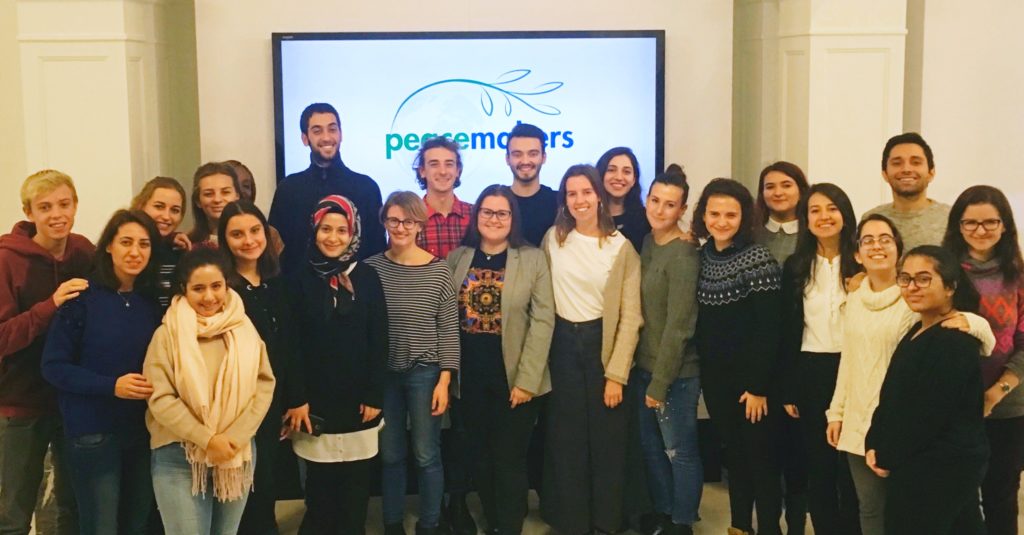
Our Goal:
The PEACEMAKERS project aims to foster a more peaceful generation in Europe and in Turkey that approaches migrants with positive attitudes. It aims to achieve this objective by developing problem-solving, critical thinking and collaborative working skills of the participants through rigorous academic preparation, experiential education and leadership development. It aims to provide students with the education, training, and experiences needed to better understand, negotiate and resolve conflicts to have more positive attitudes towards migrants. The skills such as the students’ ability to change their attitudes develops in this project, and are critical for their social life, workplace attitudes and all other mediums of exposure to people from diverse cultures. This project enhances social, civic and intellectual competencies recognized as effective tools to prevent and tackle discrimination, radicalism, and racism.
According to the current statistics by the Directorate General on Migration Management (2020), the total number of refugees and asylum seekers in Turkey is 3.645.706, the majority being Syrian refugees. According to the Council of Higher Education of Turkey (https://istatistik.yok.gov.tr/), there were 154.505 foreign students in Turkey in the period of 2018-2019 and 6592 foreign students were enrolled in the exchange programs of Farabi, Mevlana, and Erasmus during that period in Istanbul, 2137 of whom were Erasmus students. Koç University hosted 173 Erasmus and global exchange students in the 2018-2019 academic year.
The main issues the migrant students face are related to cultural differences, language, housing, health insurance and finances (Özoğlu et al., 2016). Migrants in Turkey are faced with various issues. For instance, the rising negative public perception on Syrian refugees associated with criminality and corruption is leading to reports on violence between refugees and the local population (Kaya and Kıraç, 2016).
Gaziantep has 453.409 Syrian migrants. They make up approximately 22% of the total city population. Gaziantep University (GAÜN) hosts 45.000 students in total. 5% of these students are Syrian students, which is approximately 3000 students. In addition, cultural incompatibilities derived from the desire of immigrants to live in accordance with their own culture lead to legal and social challenges. For this reason, there is a need for educational trainings that facilitate migrants’ adaptation to the society by increasing both their awareness and knowledge of social inclusion. Therefore, Gaziantep University implements social, cultural, and integrative activities and projects for all international students.
Over three million people, which is nearly 20% of the population in the Netherlands, have a non-Dutch background, counting immigrants and Dutch-born people with one or both parents born abroad, according to statistics from Focus Migration. A little more than half of these immigrants are of non-Western origin. According to an estimate of a WOCD report (Wetenschappelijk Onderzoek- en Documentatiecentrum), there were 35.530 undocumented migrants (those whose asylum application is rejected and finalized, and students or tourists who have stayed in the Netherlands ever since their arrival) in 2015. A large share of immigrants with 38% having a non-Western background make up part of the population in Rotterdam, the second largest city after Amsterdam. Erasmus University, located in Rotterdam, has over 28.000 students, with over 5.800 international students. Majority of the international students are from Germany, followed by students from Italy and Greece. A one-year preparatory programme has been developed by the university to offer students with refugee status the preparation for a higher education study.
In 2018, 25,5% of Germany’s (52,4% of them holding German citizenship) and 31,6% of Berlin’s inhabitants had a family history of migration (According to the definition of the German Federal Statistical Office a person has a migration background if he or she or one parent was born with non-German citizenship). Migrants face hostile attitudes widely. A recent study (Decker/Brähler 2018) reports about 30% of the population holding xenophobic attitudes towards foreigners. In general, young people exhibit less hostile attitudes than the other age groups (Canan/Foroutan 2016). Out of 35.981 students of Humboldt University, 16% (5671) are international, degree-seeking students and about 1000 students came on Erasmus.
4,1% (480.300) of the total population of Portugal (SEF, Relatório de Imigração Fronteiras e Asilo, 2018) and 14% of the students of Universidade Aberta are migrants. According to a study led by ICS_IUL, Atitudes Sociais dos Portugueses in 2016, the Portuguese population is more open and understanding to the coming of refugees, but is more reluctant and less tolerant towards immigration. Racism and xenophobic attitudes are a growing concern among authorities and are getting more attention from the media.
There are 5 million foreign nationals legally residing in Italy, according to figures from national statistics institute Istat, which is equivalent to around 8.3% of Italy’s population of 60.5 million. Migration study foundation ISMU estimates there are some 500.000 people living in Italy illegally – equivalent to 0.9% of the population, among them failed asylum seekers and those who have outstayed their visas. In 2017, 85.244 students enrolled in the University of Bologna and among these 5.871 were international students. In 2018, it enrolled 86.509 students and among these 5.875 were international students. The doors of the University of Bologna are now open to refugee students with the Unibo4Refugees project.
